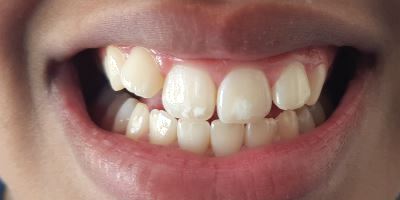
However since there is a dehydrating effect while the peroxide is in co. This is a sign of early decay.

Dental fluorosis is a condition in which one consumes too much fluoride.
White spot on tooth overnight. White spots on your teeth can also be caused by acidic foods and drinks eating away at the enamel of your teeth. If the acid sits on your teeth long enough it will start to demineralize break down the enamel which can change the color of that part of the tooth. White spot on teeth is mainly referred to as hypomineralization hypo calcification or hypoplasia of teeth.
It occurs due to mineral deficiency in tooth enamel. There are many causes of white spots on teeth which include acidity dry mouth braces on the teeth etc. White spots on teeth are not a serious problem but if left untreated it can lead to teeth decay.
A study from the National Center of Biotechnology Information NCBI suggests that demineralization of the tooth enamel is a contributing factor in white stains on teeth. Its more than a cosmetic concern. The fact is that these spots can be a sign of much bigger problems like tooth decay and weak dental enamel.
White spots or discoloration on the teeth can be caused by numerous factors. This can include illnesses and infections vitamin deficiencies excess fluoride and even trauma to the tooth. In many instances these white spots are not hazardous to the health of your teeth but they may make you may feel self-conscious.
Another common cause of a white spot is trauma to the tooth during development. Besides being a cosmetic concern for many people these white spots can actually result in the deterioration of teeth. In fact the first evidence of tooth decay is a white spot lesion meaning that the tooths enamel has been compromised leaving an opaque.
White spots on the teeth typically are a result of hypocalcified areas of enamel that occurred while the tooth was formed. These should be addressed prior to any whitening treatment as they can become more noticeable after any whitening done. Dental fluorosis is a condition in which one consumes too much fluoride.
Excess use of toothpaste and mouth rinses with high amounts of fluoride can damage the surface of the teeth resulting in white spots. Since the early 1900s fluoride has been added to tap water as a cavity prevention measure. One of the main reasons why white spots can occur is because of poor oral hygiene.
If you dont regularly brush your teeth or floss then plaque can build up. When this plaque builds white spots will start to form on the teeth. Plaque is made up of sugar and starch which bacteria in the mouth feeds off.
There are many possible causes for white spots on teeth but the most common is a condition known as hypomineralization hypocalcification or hypoplasia. Whatever word you hear a dentist use to describe the condition it refers to the loss of minerals from tooth enamel and it is quite common. If you have a few of these white spots or they are in.
This white spot or area of decalcification indicates calcium is leaching from your tooth. The spots initially cause no harm except for the appearance especially if its on your front tooth. The area signifies loss of minerals which weakens the enamel and eventually can lead to tooth decay.
How to get rid of White Spot on Teeth Overnight. There is several remedy that can help eliminate white spots but the best procedure will depend on the severity of your condition and how much it costs to treat. Here are some options to discuss with your dentist.
Bleach-based tooth whitening can help balance the color of your tooth enamel. A white spot may appear where minerals have been lost. This is a sign of early decay.
Tooth decay can be stopped or reversed at this point. Enamel can repair itself by using minerals from saliva and fluoride from toothpaste or other sources. But if the tooth decay process continues more minerals are lost.
Bleaching the teeth will make the white spot which as Dr. Leach said is caused by either decalcification or fluorosis less noticeableafter the bleaching process is done. However since there is a dehydrating effect while the peroxide is in co.
White spot lesions may be due to fluorosis overexposure of fluoride to the teeth enamel hypoplasia thinner development of the enamel on teeth demineralization of the enamel on the teeth low calcium diet and poor oral hygiene. The good news though its treatable and can be reversed. White spots on teeth after whitening.
Teeth whitening is known to be effective and harmless but there is a slight risk of experiencing white stains on teeth soon after. While these white stains on teeth after whitening are not a result of teeth whitening the white spots may have already been present but became more visible due to the process. Whether its white spots on your teeth or white patches see your dentist.
He or she can help polish the teeth and whiten up the surrounding tooth for a better cosmetic appearance. In extreme cases you and your dentist may find that applying veneers to the teeth once they have been re-strengthened gives you the cosmetic look you prefer. The techniques used for removing white spots on teeth depend on the cause of the white spot and what treatment you are willing to go through.
Some white spots may be improved with no need to drill but some white spots may only be covered up with crowns. Every case is individual and get yourself booked in with a dentist to find out your options. White stains on teeth come from hypo-calcification or the loss of calcium in tooth enamel.
Common causes of hypo-calcification include exposure to too much fluoride a high sugar or acid diet heavy plaque or the removal of orthodontic bands and brackets.